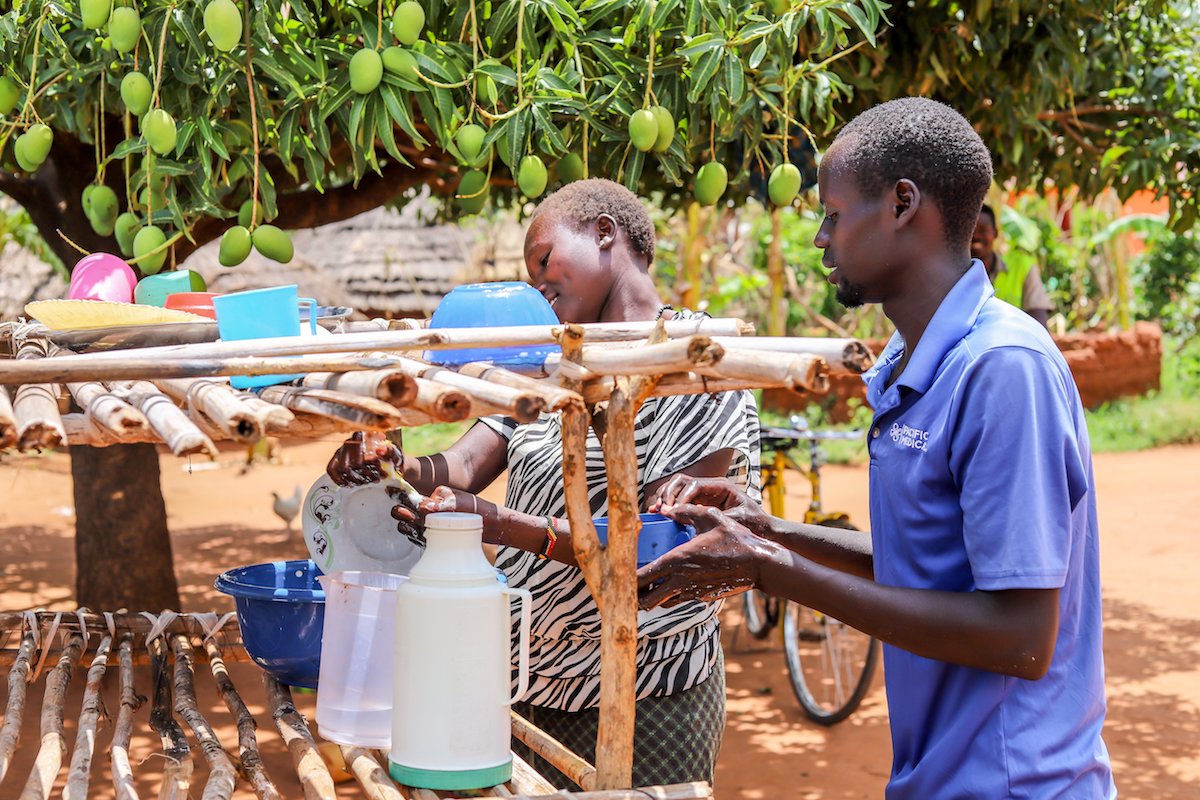NAIROBI, Kenya (CNS) — It is not unusual these days to find Raymond Okello, who lives in the Karamoja area of northeastern Uganda, washing dishes, tending the kitchen garden, or caring for the baby when home.
Those are new roles for sure.
Okello is among men from the Karamojong, a nomadic pastoralist community living a traditional agrarian life, who are defying long-held norms to take up roles that for generations had been assigned to women and girls.
In the rural villages, the changing roles are being noticed by women, who have expressed both disbelief and excitement. For their part, the men have gradually embraced the new roles and willingly showcase their new abilities.
“I feel I have changed for the better. I was not hardworking before. It was difficult for me to share these roles with my wife, but now I help and even share decisions with her every day,” Okello, a 24-year-old famer, told Catholic News Service in a telephone interview. “I am happy to help in the kitchen garden, wash utensils, and do other chores.”
In the same area, farmer Jimmy Orebo, 43, recently joined his wife in the garden to produce food for the family.
“We no longer buy tomatoes or vegetables from the market. I count this as a positive change occurring among us due to the project’s training. There are fewer fights over money in the house since we are sharing decisions,” Orebo said.
He called for the project to be expanded, saying, “It’s very helpful.”
The men are part of a project called Nuyok coordinated by Catholic Relief Services, the humanitarian relief and development agency of the U.S. Catholic bishops. Leaders say it is designed to turn men into “change agents.”
Nuyok in the local Karamoja dialect means “it is ours.” Its main goal is to improve food security and nutrition. Since 2019, more than 1,500 men have been trained.
Northeast Uganda is the homeland of the Karamojong, a nomadic herder community whose life revolves around livestock. The tribe observes a strict culture and long-standing traditions related to gender. However, an understanding is emerging that culture practices have placed women in inferior positions while overburdening them with workloads.
According to custom, women are responsible for erecting and renovating houses, cultivating land to grow food, processing dairy products, collecting water, cooking for the family and child care plus other chores.
At the start, program officials observed wide gender imbalance with women undertaking most roles at home while holding little decision-making power. Program leaders feared such realities would hinder reaching goals related to nutrition and food security.
After two years, they see a wind of change blowing through villages as the project yields results. Here, men are constructing family latrines, planting kitchen gardens, helping care for babies and building drying racks for pots, pans and utensils. Women also are being brought into family decision-making.
“The idea is to shift some of the traditional norms that put women in inferior positions and burden them with a time-consuming workload,” explained Lillian Ojanduru, the project’s technical advisor on gender. “Sharing responsibilities and decisions will reduce the workload burden of women and also help to reduce gender-based violence. With buy-in from the traditional leaders, training and key messages being passed, attitudes are slowly shifting positively to sharing roles and responsibilities.”
Initially, the men who took on the new roles were resisted, ridiculed and seen as “lesser” after they were seen helping with household work, accompanying their wives to health care appointments, and sharing decision-making and planning with their wives.
“However, after seeing the positive changes in the households of male change agents, the resistance reduced,” Ojanduru said.
At first, many women reacted with shock, she added, because they did not expect men to undertake new responsibilities.
“They kept wondering what had happened during the three-day training their husbands had attended. They were very inquisitive because it was not normal to them that men were sweeping the compound, cleaning the utensils, fetching water, carrying their young children,” she said.
Agnes Achilla, the project’s gender manager, has found that the women are happy and excited about the changes in the men, who initially shunned the roles designated for women.
“The men freely perform the tasks … and the community members are … appreciating it,” Achilla said.
She admitted that some men continue to struggle with embracing change but acknowledged that change is gradual. Feedback from families shows that the project is yielding good results.
Achilla believes that the involvement of local government officials will lead to continuation of the practices by the men after the project officially ends.







